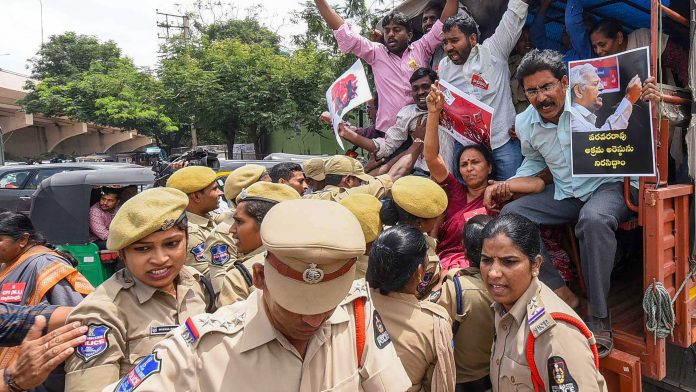
Elgar Parishad case: NIA says accused wanted to 'wage war' against nation

The National Investigation Agency (NIA) has said in its draft charges in the Elgar Parishad case that the objective of the accused was to establish their own government and “wage a war against the nation.” The Parishad had links with the outlawed Maoist groups, it alleged.
The Elgar Parishad case is related to Koregaon Bhima violence witnessed on January 1, 2018. The NIA has alleged that banned Maoists groups had organized the Parishad, an evening programme conducted in the city on December 31, 2017, on the eve of the 200th anniversary of the Battle of Bhima Koregaon.
The Maharashtra police claim that speeches made at Elgaar Parishad were at least partly responsible for instigating violence the next day. One person was killed and many injured in the violence organised at Pune’s Shaniwarwada Fort where thousands of Dalits had converged.
Media reports said the NIA had submitted the latest draft charges in early August and a copy of it was made available on Monday (August 23). The draft lays down 17 charges against 15 accused, including rights and civil liberties activists. The NIA wants the accused charged under various sections of the stringent Unlawful Activities (Prevention) Act (UAPA) and the Indian Penal Code (IPC).
The agency in October last year had submitted its first chargesheet in the case.
Also read: What we have lost with the death of Stan Swamy
The probe agency alleges that the accused were active members of the proscribed terror outfit, the CPI (Maoist). Those arrested in the case include activists Sudha Bharadwaj, Vernon Gonsalves, Varavara Rao, Hany Babu, Anand Teltumbde, Shoma Sen and Gautam Navlakha. Another accused Stan Swamy, the oldest accused in the terrorism case, was arrested last year. His bail pleas were rejected multiple times and he died on July 5, this year.
The draft charges say the main objective of the accused was to form a “people’s government through revolution and armed struggle to seize power from the State.”
It alleges the accused tried to “wage war against the governments of India and Maharashtra.”
The trial in the case will begin after the prosecution frames and describes the charges along with reliable evidence. The court will then ask the accused if they plead guilty in the case.
The draft claims the accused were playing provocative songs, enacting short plays and skits in Pune during the Elgar Parishad meeting and distributing Maoist literature. “The criminal conspiracy was meant to bring about secession of a part of the territory of India and incite individuals to bring about such secession,” it said.
It alleges that the accused had the intention to “strike terror in the minds of people by using explosive substances”.
“The accused recruited students from various universities, including the Jawaharlal Nehru University and Tata Institute of Social Science for commission of terrorist activity,” it said.
Also read: Opposition parties unite to seek accountability in Stan Swamy’s death
The accused have been charged under IPC sections 120-B (conspiracy), 115 (abetment of offence), 121, 121-A (waging war against the state), 124-A (sedition), 153-A (arms in procession), 505(1)(B) (statements promoting mischief) and 34 (common intention).
They have also been charged under UAPA sections 13, 16, 17, 18, 18A, 18B, 20 (punishment for terrorist activities), 38, 39 and 40 (punishment for being part of a terrorist organisation).
The Koregaon-Bhima war memorial is located on the outskirts of the western Maharashtra city of Pune.
Before the event, two marches were organised through several districts of Maharashtra and culminating in Pune with artists, activists, theatre performers and musicians among others. These marches held public meetings to rally support for Dalit victims of atrocities and collect donations for the Elgar Parishad.

